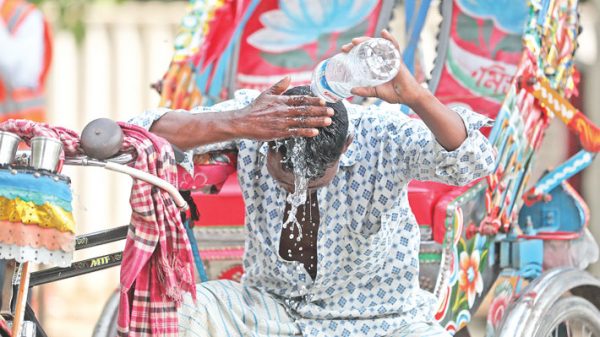Heatwave: Experts warn of health risks

- Update Time : Monday, April 17, 2023
- 95 Time View

The country is currently experiencing a severe heatwave that has the potential to cause significant harm to people’s health, particularly among children, the elderly, and those with pre-existing conditions.
Hospitals and doctors’ chambers have reported a surge in patients suffering from dehydration, asthma, hypertension, fever, and diarrhea, with Dhaka experiencing its highest temperature in decades, with the mercury soaring to 40.5 degrees Celsius on Sunday.
Experts have advised people to take precautions during the heatwave to avoid health complications.
Associate Prof Dr. Md Fazle Rabbi Chowdhury, from the Department of Internal Medicine at Bangabandhu Sheikh Mujib Medical University, warned that people over the age of 60 and children under the age of 10 are the most vulnerable to the heatwave.
“The excessive heatwave may cause dehydration in the body, lower blood pressure, cardiac collapse, heat stroke, and skin burn,” he said. Patients with co-morbidities such as uncontrolled diabetes, chronic kidney disease, asthma, and skin disease patients are also at higher risk and should take extra precautions.
Chowdhury advised people to drink at least 2 to 2.5 liters of water a day to stay hydrated and wear full-sleeved clothing to avoid direct sun exposure.
Prof. Dr. Md. Jahangir Alam, director at Bangladesh Shishu Hospital & Institute, suggested keeping children hydrated and indoors during the heatwave to avoid heat-related illnesses.
He warned that if parents do not keep children away from direct sunlight and take them to markets and shopping malls during hot weather, it could affect their health when an influx of diarrhea and cold disease patients occur.
However, sources from different hospitals and private chambers of doctors have reported that a number of patients, particularly children, are suffering from influenza, cold diseases, and summer diarrhea.
Raisul Islam, a private job holder and resident of the city’s Mirpur area, told the Daily Sun, “My baby boy aged 17 months, is suffering from fever for the last two days.”
The icddr,b sources have said that the hospital is facing a slight increase in the number of diarrhea patients, with the daily number of patients remaining around 500, while it was around 450 a week ago.
According to the World Health Organization (WHO), heatwaves can have a significant impact on society, including a rise in heat-related deaths.
“Population exposure to heat is increasing due to climate change. Globally, extreme temperature events are observed to be increasing in their frequency, duration, and magnitude,” it said.
The WHO further warned that even small differences from seasonal average temperatures are associated with increased illness and death.
“Temperature extremes can also worsen chronic conditions, including cardiovascular, respiratory, and cerebrovascular disease and diabetes-related conditions,” it said.
To stay safe during a heatwave, the WHO recommended keeping living spaces cool and maintaining the ideal room temperature below 32°C during the day and 24°C during the night, particularly for infants or people who are over 60 years of age or have chronic health conditions.
The WHO also advised opening all windows and shutters during the night and early morning, when the outside temperature is lower (if safe to do so).
Electric fans may provide relief, but when the temperature is above 35°C, they may not prevent heat-related illness. It is important to drink fluids, wear light, loose-fitting clothes made of natural materials, and go outside wearing a wide-brimmed hat or cap and sunglasses.
The WHO also suggested eating small meals more often and avoiding foods that are high in protein.















